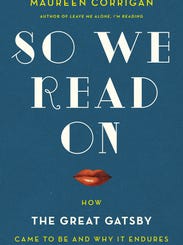It’s been 89 years since F. Scott Fitzgerald’s Jazz Age masterpiece, The Great Gatsby, was published. Since then it’s been read and revered by millions who’ve been captivated by the glittery, tragic tale of Jay Gatsby and his elusive love, Daisy Buchanan. One of those is Maureen Corrigan, 59, the book critic for NPR’s Fresh Air. Corrigan, who lives in Washington, D.C., and teaches at Georgetown University, spoke with USA TODAY’s Jocelyn McClurg about her new book, So We Read On: How The Great Gatsby Came To Be and Why It Endures (Little, Brown).Q: You boldly state that The Great Gatsby isn’t just the great American novel. It’s the "greatest," you say. What’s the No. 1 reason why?A: The language. I think it’s a novel that takes ordinary American language and makes it unearthly. The story that it tells of somebody trying to be better, trying to be greater, trying to be more is certainly a story we identify as an American story. It’s the way Fitzgerald tells it that just takes your breath away.

